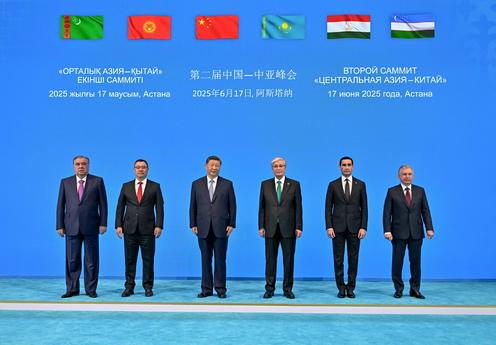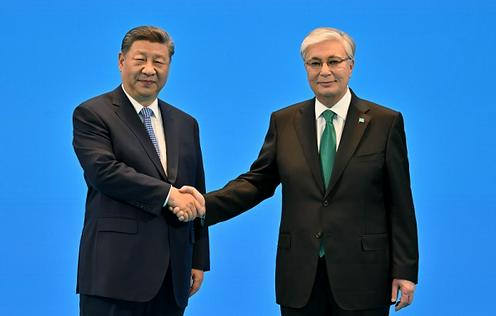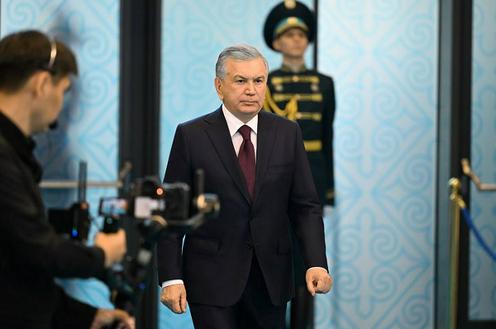The capital of Kazakhstan hosted the second “Central Asia–China” summit, a follow-up to the inaugural meeting held in Xi’an in 2023. The summit brought together the leaders of six countries: Kazakhstan, Kyrgyzstan, Tajikistan, Turkmenistan, Uzbekistan, and China. Its most significant outcome was the signing of the Treaty on Eternal Good-Neighborliness, Friendship, and Cooperation. According to political analyst Andrei Chebotarev, this is the first international legal agreement signed jointly by the six heads of state. Step by step, Beijing is consolidating its influence in the region, integrating Central Asia into its grand “Belt and Road” initiative. But such close friendship may also carry hidden risks. More on this in Fergana’s full report.
The President of China arrived in Astana on June 16 for a two-day official visit and was welcomed with the highest honors, as is customary. At the airport, Xi Jinping was greeted by an honor guard, children waving the two countries’ flags, and President Kassym-Jomart Tokayev himself.
Later, at the Akorda presidential palace, the two leaders exchanged warm greetings. Tokayev described China as a good neighbor, a close friend, and a reliable partner. “The Chinese people have never harmed the Kazakh people,” he said, adding that recent geopolitical upheavals have no bearing on the relationship between the two countries.
“China has never imposed any political conditions in its cooperation with Kazakhstan. We value your unwavering support for our sovereignty and security guarantees. We support China’s peace-oriented initiatives and deeply appreciate your country’s key role in shaping a just world order,” Tokayev added.
For his part, Xi Jinping expressed admiration for Kazakhstan’s achievements and said he took joy in the country’s success. According to him, the relationship between China and Kazakhstan has stood the test of a turbulent global landscape, and in recent years, “the China-Kazakhstan community of shared destiny has been continuously enriched with new content.” It is worth noting that Kazakhstan, benefiting from Beijing’s favor, has become a central link in the development of China’s ties with the Central Asian republics.
Following the bilateral talks, the two heads of state signed 24 intergovernmental and interagency agreements in areas such as energy, customs, agriculture, healthcare, science, and others. Meanwhile, at the Second Forum on Industrial and Investment Cooperation between Central Asia and China, companies from Kazakhstan and China concluded 58 commercial and investment deals totaling more than $24 billion.
The next day, June 17, Xi Jinping sat at the same table with the leaders of all five Central Asian countries. During the summit, each of them outlined their respective priorities in relations with China.
President of Uzbekistan Shavkat Mirziyoyev advocated for the creation of a multilateral trade platform called the “Electronic Silk Road.” He also proposed establishing a regional center for industrial standardization and certification in Tashkent to certify export goods in line with Chinese requirements. In addition, the Uzbek leader highlighted the need for a long-term strategy dubbed the “Central Asia–China Industrial and Infrastructure Belt.” The initiative envisions a network of interconnected industrial clusters, technology parks, and logistics hubs, supported by Chinese investment and technological expertise.
Mirziyoyev also emphasized the need to introduce financial instruments to support large-scale regional projects.
“The existing international mechanisms undoubtedly play an important role, but they do not fully meet the region’s investment needs. According to experts, the infrastructure investment gap in Central Asia amounts to hundreds of billions of dollars,” he noted, proposing the establishment of a Central Asia–China Development Fund that could serve as a platform for advancing infrastructure initiatives.
Uzbekistan is also interested in cooperation with China in the fields of artificial intelligence and digital technologies. To this end, Mirziyoyev proposed the creation of a network of mutually integrated big data banks and processing centers, as well as the construction of a Digital Corridor — an optical fiber communication line — linking Central Asia and China along key energy and transport routes.
Finally, citing China’s extensive experience in working with Afghanistan, Uzbekistan called for support in the country’s reconstruction and its inclusion in regional integration processes.
President of Kazakhstan Kassym-Jomart Tokayev stated at the summit that Central Asia is becoming a major logistics hub between China and Europe. In 2024 alone, over 211,000 containers from China passed through the region. Kazakhstan handles 85 percent of all overland freight from China to Europe. The Kazakh authorities are interested in deepening cooperation with Beijing in this area and have proposed a joint project to build a cargo terminal at the port of Kuryk on the Caspian Sea.
Astana is also preparing to sign a cooperation agreement with China in the field of nuclear energy. On June 14, Kazakhstan’s authorities announced that Russia’s Rosatom had been selected to lead an international consortium for the construction of the country’s first nuclear power plant. China’s CNNC may become the leading contractor for a second plant.
Kyrgyz President Sadyr Japarov outlined six priority areas for strengthening his country’s strategic partnership with China: transport and transit connectivity, energy, finance, e-commerce, education and science, tourism, and security.
President of Tajikistan Emomali Rahmon identified key areas of cooperation as the energy sector, including “green” energy, processing of important mineral resources, development of industry, transport and freight, as well as agriculture. Rahmon supported the initiative to develop programs for industrial clusters and spoke in favor of advancing the “Dushanbe Process for Glacier Preservation.”
Turkmen leader Serdar Berdimuhamedov announced his readiness to discuss diversifying Turkmenistan’s natural gas supplies to China, as well as advocated expanding the geography and volume of electricity exports. He proposed strengthening partnership in transport within the framework of the “Revival of the Great Silk Road” strategy and launching joint programs in artificial intelligence, satellite and space research, and digitalization.
In turn, Xi Jinping highlighted several areas that, in his view, would deepen China’s engagement with the region’s countries. On one hand, he proposed cooperation in defense, including joint efforts to combat terrorism, separatism, and extremism. On the other hand, he emphasized leveraging the potential of China’s economic and logistics initiative “One Belt, One Road,” which would expand collaboration in trade and investment, industry, agriculture, energy, transport, tourism, and culture.
Due to recent global developments, the participants of the meeting repeatedly touched on “security-related” issues, calling the use of forceful methods to resolve conflicts “unjustified and unacceptable.” Although the summit began with ceremonial speeches, writes the Kazakh newspaper Vremya, the main part of the negotiations, as usual, took place behind closed doors. The regional leaders also held bilateral meetings with the Chairman of China. The details of these talks were not disclosed, but, according to observers, it is in these private discussions where the most sensitive issues are addressed — from infrastructure deals to geopolitical compromises.
At the conclusion of the forum, the heads of state signed the Astana Declaration, as well as the Treaty on Eternal Good-Neighborliness, Friendship, and Cooperation between the countries of Central Asia and China. Its provisions, among other things, enshrine the “mutual non-use of force or threat of force, peaceful resolution of disputes,” as well as respect for the principles of territorial integrity of states.
“Kazakh political analyst Andrey Chebotarev notes that, judging by Xi Jinping’s speech, China is firmly committed to observing international legal norms in trade, opposing protectionism, hegemonism, and ‘tariff and trade wars,’” he says. “It [Beijing] also appears interested in strengthening the World Trade Organization (WTO), expressing support for Turkmenistan and Uzbekistan joining it. In the context of the ‘trade war’ between the US and China and the ‘sanctions war’ between the West and Russia, the Central Asian republics can count on a certain level of support from China regarding their economic security. Moreover, China intends to provide them with a grant of 1.5 billion yuan to support important projects.”
Chinese President Xi Jinping announced at the summit that Beijing will allocate a grant of 1.5 billion yuan (nearly $209 million) to the Central Asian states. He also promised to provide 3,000 quotas for representatives of these countries to attend preparatory courses in China for in-demand professions.
The meeting in Astana took place simultaneously with the G7 summit in Canada, where U.S. President Donald Trump called China’s joining the group a “not bad idea.” However, Beijing seemed to reject his proposal. “If the G7 aims to establish constructive relations with China, they must in practice adhere to principles of mutual respect, equality, and benefit instead of issuing directives to China and making irresponsible statements,” the Chinese foreign ministry stated (quoted by TASS).
Beijing feels much more comfortable engaging in dialogue with Central Asia, where it is steadily increasing its influence and which could assist it in the event of a potential conflict with the United States, Bloomberg writes.
“Observing the West’s attempts to use its economic influence to isolate Russia, Beijing is developing strategies to protect its economy from any future confrontation with the U.S.,” said Kate Mellinson, an analyst at the London consulting firm PRISM Strategic Intelligence, to the agency.
While the West has only recently started paying close attention to the region, for China it has historically been part of its geopolitical and economic sphere of relations.
“For Kazakhstan (and not only Kazakhstan), these negotiations and these relations are much more important and significant than the current G7 summit, which has long lost its global significance,” says political analyst Daniyar Ashimbaev.
At the same time, Russia should not be discounted, as the Central Asian countries remain its “historic allies and partners.” Moscow observes China’s growing closeness with the region but has so far not expressed concerns about it.
Caught in the midst of competing interests from larger players, the Central Asian states receive generous offers for cooperation. However, economist Dosym Satpaev points out the downside of this situation.
“Any tension between the U.S. and China will automatically ‘hit’ Central Asia and Kazakhstan [in particular]. Hypothetically, if Donald Trump takes a tougher stance toward China and demands greater loyalty to the U.S. from all countries than to China, we will find ourselves in a difficult position. If sanctions are also applied to China’s allies... this will become a major problem for us. In other words, we find ourselves in a rather delicate situation, and the next three years will also be quite challenging for us,” he is convinced.
-
 05 February05.02The “Guardian” of Old Tashkent Has Passed AwayRenowned local historian and popularizer of Uzbekistan’s history Boris Anatolyevich Golender dies
05 February05.02The “Guardian” of Old Tashkent Has Passed AwayRenowned local historian and popularizer of Uzbekistan’s history Boris Anatolyevich Golender dies -
 24 December24.12To Clean Up and to ZIYAWhat China Can Offer Central Asia in the “Green” Economy
24 December24.12To Clean Up and to ZIYAWhat China Can Offer Central Asia in the “Green” Economy -
 23 December23.12PhotoTokyo DriveJapan to invest about $20 billion in projects across Central Asia over five years
23 December23.12PhotoTokyo DriveJapan to invest about $20 billion in projects across Central Asia over five years -
 17 December17.12Sake for SixCentral Asia’s Rapprochement with Japan Comes with Hidden Pitfalls
17 December17.12Sake for SixCentral Asia’s Rapprochement with Japan Comes with Hidden Pitfalls -
 17 December17.12Gulshan Is the BestYoung Uzbek Karateka Becomes World Champion
17 December17.12Gulshan Is the BestYoung Uzbek Karateka Becomes World Champion -
 24 November24.11Here’s a New TurnRussian Scientists Revive the Plan to Irrigate Central Asia Using Siberian Rivers
24 November24.11Here’s a New TurnRussian Scientists Revive the Plan to Irrigate Central Asia Using Siberian Rivers






